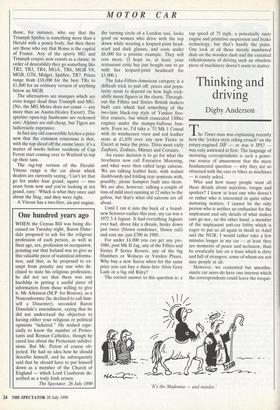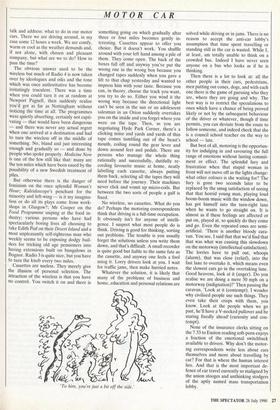Thinking and driving
Digby Anderson
The Times man was explaining recently how the `jockey-style riding crouch' on the rotary-engined JSP — or was it JPS? was only awkward at first. The language of motoring correspondents is such a gener- ous source of amusement that the more fundamental question — why they are so obsessed with the cars or bikes as machines — is rarely asked.
Who and how many people want all these details about injection, torque and spoilers? I know at least one who doesn't or rather who is interested in quite other motoring matters. I cannot be the only person who is neither an enthusiast for the unpleasant and oily details of what makes cars go nor, on the other hand, a member of the unpleasant anti-car lobby which is eager to put us all again in thrall to Aslef and the NUR. I would rather take a few minutes longer in my car — at least they are moments of peace and seclusion, than be erratically late on a train which is dirty and full of strangers, some of whom are not nice people at all.
However, we contented but unenthu- siastic car users do have one interest which the correspondents could leave the torque-
'It's the Madonna — and minder.'
MOTOR CAR
talk and address: what to do in our motor cars. There we are driving around, in my case some 12 hours a week. We are comfy, warm or cool as the weather demands and, if not alone, with chosen and pleasant company, but what are we to do? How to pass the time?
The obvious answer used to be the wireless but much of Radio 4 is now taken over by ideologues and oiks and the tone which was once authoritative has become irritatingly truculent. There was a time when you could turn it on at random at Newport Pagnell, then suddenly realise you'd got as far as Nottingham without noticing the time at all. The programmes were quietly absorbing, certainly not capti- vating — that would have been dangerous — and there was never any actual regret when one arrived at a destination and had to turn the wireless off in the middle of something. No, bland and just interesting enough and gradually so — and done by people who spoke properly. Medicine Now is one of the few still like that: many are the ten miles which have been eased by the possibility of a new Swedish treatment of piles.
But otherwise there is the danger of feminism on the once splendid Woman's Hour; Kaleidoscope's penchant for the minority and left-wing — is it my imagina- tion or do all its plays come from work- shops in Glasgow?; Mr Cooper on the Food Programme sniping at the food in- dustry; various persons who have had spectacularly boring lives all choosing to take Edith Piaf on their Desert Island and a most unpleasantly self-righteous man who weekly seems to be exposing dodgy buil- ders for tricking old age pensioners into having extensions built on bungalows in Bognor. Radio 3 is quite nice, but you have to turn the knob every two miles.
Cassettes are useless. They merely give the illusion of personal selection. The attraction of .the wireless is that you have no control. You switch it on and there is something going on which gradually after three or four miles becomes gently in- teresting. Cassettes appear to offer you choice. But it doesn't work. You shuffle around with your left hand among a pile of them. They come open. The back of the boxes fall off and anyway you've put the wrong one in the wrong box because you changed tapes suddenly when you gave a lift to that chap yesterday and wanted to impress him with your taste. Because you can, in theory, choose the track you want, you try to do so. Either you wind it the wrong way because the directional light can't be seen in the sun or an adolescent salesman in an Orion suddenly overtakes you on the inside and you forget where you were on the tape. Then, as you are negotiating Hyde Park Corner, there's a clicking noise and yards and yards of thin tape comes tumbling out of the beast's mouth, coiling round the gear lever and down around feet and pedals. There are persons who manage the whole thing rationally and successfully, dutifully re- cording favourite music at home, neatly labelling each cassette, always putting them back, selecting all the tapes they will need before the journey. Their machines never click and vomit up micro-coils. But between the two sorts of people a gulf is fixed.
No wireless, no cassettes. What do you do? Perhaps the motoring correspondents think that driving is a full-time occupation. It obviously isn't for anyone of intelli- gence. I suspect what most people do is think. Driving is good for thinking, sorting out problems. The trouble is you usually forget the solutions unless you write them down, and that's difficult. A small recorder is quite good but liable to the same fate as the cassette, and anyway one feels a fool using it. Lorry drivers look at you. I wait for traffic jams, then make hurried notes.
Whatever the solution, it is likely that many of the problems of business and home, education and personal relations are 'To him, you're just a bit off the side.' solved while driving or in jams. There is no reason to accept the anti-car lobby's assumption that time spent travelling or standing still in the car is wasted. While I, at least, am totally unable to think on a crowded bus. Indeed I have never seen anyone on a bus who looks as if he is thinking.
Then there is a lot to look at: all the other people in their cars, pedestrians, men putting out cones, dogs, and with each one there is the game of guessing who they are, where they are going and why. The best way is to restrict the speculations to ones which have a chance of being proved likely or not by the subsequent behaviour of the driver or whatever, though if time permits, you can deviate from the route to follow someone, and indeed check that she is a council school teacher on the way to school — late.
But best of all, motoring is the opportun- ity for indulging in and savouring the full range of emotions without lasting commit- ment or effect. The splendid fury and frustration when that stupid woman in front will not move off as the lights change: what other colours is she waiting for? The ' fury is gone two seconds later to be replaced by the smug satisfaction of seeing that that horrid young man, playing loud boom-boom music with the window down, has got himself into the turn-right lane when he wants to go straight on. It is almost as if these feelings are affected or put on, played at, so quickly do they come and go. Even the repeated ones are semi- artificial. 'There is another bloody cara- van. You see, I said that that we'd find that that was what was causing this slowdown on the motorway (intellectual satisfaction). The lorries have to pull out, whoops (alarm), that was close (relief), into the fast lane to overtake it, which means even the slowest cars go in the overtaking lane.
Good heavens, look at it (anger). Do you realise we are doing a mere 50 mph on a motorway (indignation)?' Then passing the caravan, 'Look at it (contempt). I wonder why civilised people use such things. They even take their crisps with them, you know. Look at the people when we go past, he'll have a V-necked pullover and be staring fixedly ahead' (curiosity and con- tempt).
None of the insurance clerks sitting on the 7.53 to Euston reading soft-porn enjoys a fraction of the emotional switchback available to drivers. Why don't the motor- ing correspondents write less about cars themselves and more about travelling by car? For that is where the human interest lies. And that is the most important de- fence of car travel currently so maligned by the union stooges and unthinking stodgers of the aptly named mass transportation lobby.



















































 Previous page
Previous page